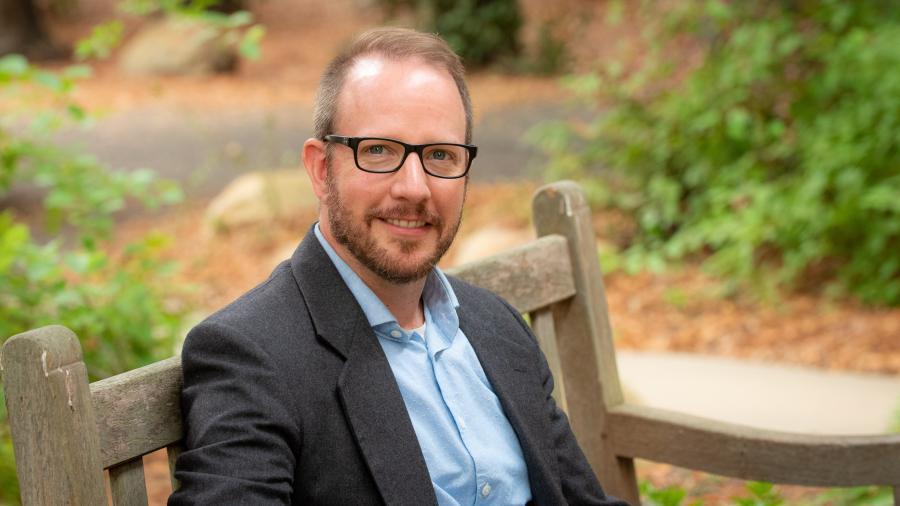Westmont Magazine Exploring the Links Between Religion and Mental Health

As a teenager, Blake Kent began to notice that some family members and friends fit in at church—they felt at home there and considered it coherent with their values and experience. Others struggled to establish a sense of belonging. Instead of church serving as a safe haven, it seemed like an uncertain space, full of internal and external conflicts and contradictions. These observations inspired Kent’s lifelong interest in studying how people experience God and religion and the intersection between faith and mental health.
Kent joined the Westmont faculty as an assistant professor of sociology in 2020. A prolific author of research studies, he has published 11 in the last year. Prior to joining Westmont, he served as a postdoctoral research fellow with the Harvard Medical School/Massachusetts General Hospital Center on Genomics, Vulnerable Populations and Health Disparities, where he now serves as a research associate. He is also a non-resident scholar at Baylor University’s Institute for Studies of Religion, where he joins colleagues from his doctoral work in the sociology of religion and mental health.
While Kent completed initial graduate work in theology at Regent College, he learned that many of his friends there spent two semesters taking courses from a mental health professional. “They described those experiences as personally challenging,” Kent says. “They were asked to do a lot of introspective work that included identifying misconceptions in how they perceived God or how God perceived them. They found it very difficult.”
After seminary, Kent served as a college and high school pastor, where he observed how both individual perceptions of God and religious and cultural dynamics shape people. When he began his doctoral studies at Baylor, he caught a vision for studying the intersection of religion and well-being.
“Research in this area is important because it helps provide a framework for talking about a topic that can be personal and even existentially threatening,” he says.
Some Christians feel that God doesn’t love them like he loves others. Kent uses an attachment paradigm to assess such fears. “Attachment helps us see that our relational experience of God is deeply connected to early childhood experiences,”he says.“Understanding that can bring explanation and relief.”
Kent recently released findings on two national studies that followed more than 12,000 American adolescents from their teens into middle adulthood. “Religion/ Spirituality and Gender-Differentiated Trajectories of Depressive Symptoms Age 13-34” in the Journal of Religion and Health examined the link between religious experiences and depression. It found attending religious services staves off depression, but it also ties life-changing spiritual experiences and a belief in divine leading and angelic protection to an increased risk for depression, especially in men. Perhaps people more prone to depression seek divine experiences to improve their mental health. Or involvement in churches emphasizing divine leading may lead to disappointment when people struggle to connect with God.
“Much of the research on religion and depression focuses on attending religious services and other commonly studied variables such as prayer or personal religiosity,” he says. “Questions about spiritual experiences and belief in divine leading are rare in big epidemiological studies, so this was a great opportunity to add nuance to what we know about religion and mental health.”
Another study, “Adolescent Context and Depressive Symptom Trajectories in a National Sample: Ages 13 to 34,” in the International Journal of Mental Health and Addiction, found that positive and caring relationships in the teenage years make a lasting impact on mental health. Warm relationships with parents, friends and teachers are highly effective safeguards against depressive symptoms later in life, as is educational achievement. Teenage romantic relationships, pregnancy and multiple sex partners pose modest risks, while use of alcohol, tobacco and marijuana reveal mixed associations.
“Previous research on depressive symptoms looked at many of the same environmental factors, such as family and peer relationships, school experience, religious activity, delinquent behaviors, drug use and sexual activity, but not commonly all at once,” he says. “We wanted to get as complete a picture of the adolescent environment as possible. The data allowed us to do that.”
He looks forward to working with a team from Harvard and Baylor that received funding for a major project examining religion and health in more than a dozen countries. “This project will provide important data for cross-national comparisons,” he says. “These kinds of comparisons will help us understand how religion and health work together, or against each other, in different cultural, religious and ethnic settings.
“Westmont is a great place to do this work because it has resources for faculty who want to do research. I’m able to teach remarkable students while staying active in my research agenda. In fact, I’ve just found a super-smart student who’ll serve as my research assistant on a project this summer.”